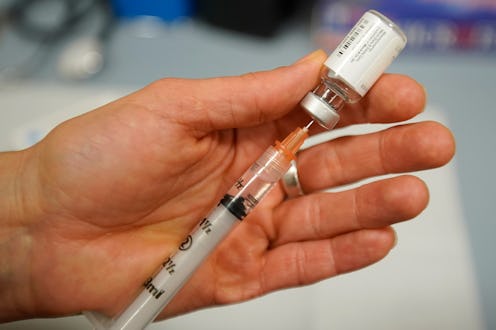Life
5 Signs & Symptoms Of Measles That Doctors Want You To Know

We've all been hearing a lot about measles lately, and with good reason: In a 2019 report published by the Center for Disease Control and Prevention (CDC), a very real cause for concern was highlighted: We're in the midst of one of the biggest outbreaks of measles in decades. Yet, many of us are still not entirely clear on whether or not we're at risk or why — so knowing the signs and symptoms of the measles is more important now than ever. The CDC's report revealed that, to date, 704 individual cases of measles have been confirmed in 22 states since Jan 1, 2019. For comparison, the entire calendar year of 2018 had only 372 measles cases. This is highest number of cases reported in the U.S. in over two decades, and since the measles were declared eliminated in 2000.
Due to widespread vaccinations, the U.S. basically had the measles totally under control until recently — and according to the CDC, the only way to control the measles outbreak is for all children who are not medically exempt to get vaccinated against it. Aka, we have to build our defense back up to stop the spread and treat the outstanding cases efficiently.
Bustle talked to Dr. Jen Caudle, (Family Physician, Associate Professor, Rowan University School of Osteopathic Medicine) about the severity of the outbreak and exactly what we should be looking out for, symptom-wise. On a call to Bustle, Dr. Caudle said, "measles are really serious, so we have to take it very seriously."
According to Caudle, the measles are so contagious that if an infected person were to sneeze in a room and leave, an unvaccinated person could walk into that room up to two hours later and contract the virus just from inhaling the lingering particles.
Terrified? Same. Here are the signs and symptoms Dr. Caudle says to look out for:
Fever
The first sign of the measles is typically a mild to moderate fever that lasts for a few days. This will occur 10 to 14 days after you're exposed to the virus. Before that time, you won't notice any symptoms as it takes that long for the virus to incubate. A fever is considered any lasting temperature that's over 100.4 F. If you have a fever and you've recently traveled outside of the country or potentially come into contact with someone who is infected with the measles, talk to your doctor immediately.
Cold Symptoms
A continuous cough, a runny nose, and mild to moderate congestion will be noticeable shortly after the fever arrives if you have the measles. You might notice that your eyes and throat are itchy and sore as well. All of these cold-like symptoms will last for at least two days and can be indicative of measles virus.
Pink Eye
You might notice that your eyes are pink, swollen, itchy and/or irritated. Pink eye, or conjunctivitis, is a common symptom of measles, especially when it's paired with a fever and other cold-like symptoms.
Spots In Your Mouth
If you look inside of your cheeks, you'll notice tiny white spots with bluish-white centers on a red background, also known as Koplik's spots. This is typically the last symptom before the full body rash arrives and the body is considered to be in the early measles stage still.
A Rash On Your Body
"The rash is peculiar and unique and the biggest indicator of the measles," Dr. Caudle tells Bustle. A potentially full body rash that features large flat blotches is one of the most common signs of the measles. The blotches might blur into each other and appear randomly or in clusters. The above picture is representative of what the body might look like after a few days of having the measles.
"Nine out of ten people who are not protected will get infected by being around someone who is infected," Caudle tells Bustle, stressing how important it is to contain and control the virus.
If you're not sure if you've been vaccinated, you can check with your health care provider, as they'll be able to look up your vaccination records. Caudle reminds us too that many people can't be vaccinated, due to health conditions that prevent it, which means that we have to be extra protective and diligent about eliminating this virus again on behalf of the people who are already affected and those that can't protect themselves on their own.